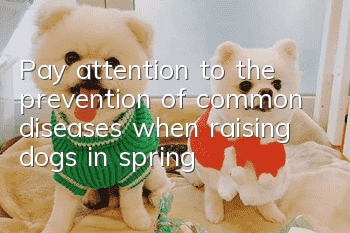Pay attention to the prevention of common diseases when raising dogs in spring

Husky
Prevention of common dog diseases in spring
Spring is the season when various infectious diseases occur, and it is the season when animals are in estrus and breed. With increased opportunities to go out, the chances of contracting infectious diseases also increase. Injecting vaccines on time is the most fundamental guarantee for preventing various infectious diseases. For young or elderly pets, due to poor immune function, more attention should be paid to protection.
In spring, the temperature changes greatly and there are many winds and sands, which greatly irritate the upper respiratory tract. The decline of local resistance makes some resident bacteria that originally existed in the respiratory tract take the opportunity to develop diseases; at the same time, due to the inhaled fine dust particles carrying more Pathogenic sources such as pollen, bacteria or viruses can directly enter the deep respiratory tract, increasing the chance of respiratory system infection. The main clinical symptoms are allergic rhinitis, tracheobronchitis, asthma and pneumonia.
In spring, spleen and stomach dysfunction and indigestion cases are also common. Unclean diet and incomplete nutrition can lead to the recurrence of original chronic gastrointestinal diseases or induce new digestive system diseases. Therefore, attention should be paid to keeping warm, preventing cold and maintaining balanced nutrition. Especially for older pets, their body functions gradually decline and they cannot adapt to changes in the outside world in a timely manner, making them prone to diarrhea or constipation.
The climate is dry in spring, and the skin becomes dry and sensitive. At the same time, spring is warm and flowers are blooming, and everything is recovering, so the proportion of allergic diseases caused by allergens such as pollen and mites is also increasing. Symptoms include skin redness, itching, rash, increased dandruff, and hair loss.
Cough: There are two types of cough. One is a cough caused by changes in temperature and cold air irritating the nasal mucosa. This kind of cough is not viral, but is caused by dry air. Generally, you can put it at home. A humidifier is enough to keep the moisture in the air. In addition, you can give your pet an appropriate amount of amoxicillin or isatis root. The other is infectious rhinotracheitis, also called nest cough. This kind of cough is often accompanied by a runny nose and requires treatment at an animal hospital. If the animal only coughs at night, it may be caused by large temperature changes at night. Just pay attention to keeping warm at night.
Diarrhea: Dogs are prone to diarrhea.
There are usually several situations:
1. Overfeeding. There will be undigested food in animal feces. Pay attention to the animal's diet, feed less food and drink more water. If the effect is not good, you can try vitamin B and give the dog one tablet.
2. Acute enteritis. Animal feces is generally black or dark green. You can feed an appropriate amount of gentamicin and vitamin B complex.
3. Caused by infectious diseases. If the cat or dog has not received vaccinations, they should go to the hospital for testing before prescribing appropriate medicine.
4. Caused by parasites. If the animal feces is sometimes dry and sometimes watery, it should be dewormed.
Excessive eye feces: First, you can check whether there are hairs stuck in the eyes, causing eye irritation. If there is a small hole in the eye, it means it was cut by something. You should go to the doctor in time.Hospital examination and treatment. Of course, sometimes getting angry can also cause more eye mucus. (Picture source: Internet)
- Can dogs eat cabbage?
- Why does a puppy sneeze?
- What does it mean when a dog is always grunting?
- Can dogs still be trained when they are older? The best time to train dogs!
- Why does the dog poop white?
- How to tell if a Labrador has canine distemper?
- Prevention and treatment of canine parvovirus disease
- How to deworm puppies?
- How do novices train a Rottweiler to be docile? Rottweiler training tips!
- How to educate a golden retriever when it eats randomly? A must-read for novice dog trainers!



